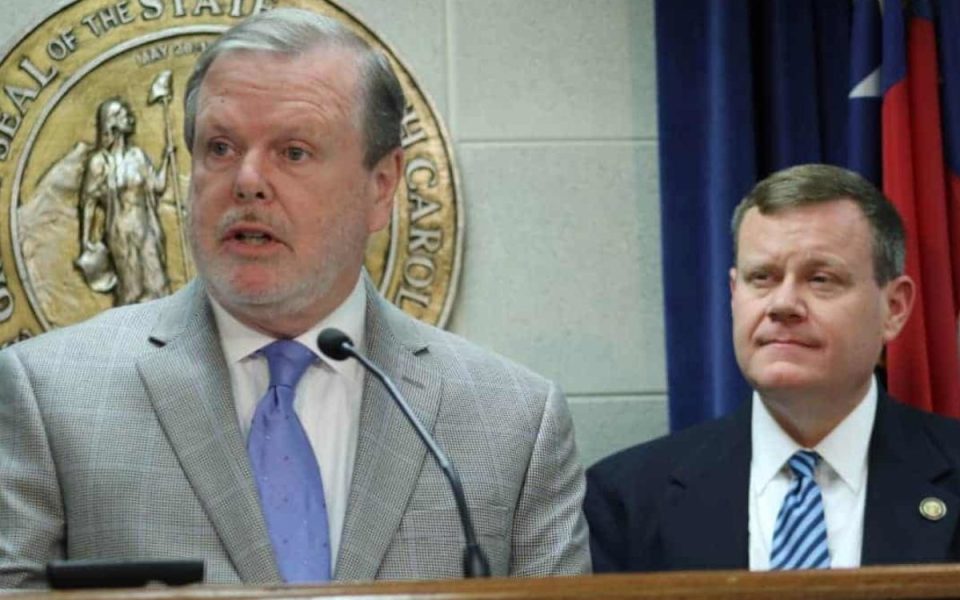This story was first published by Education NC on Dec. 14, 2021.
by Alex Granados
North Carolina House Speaker Tim Moore, R-Cleveland, and Senate President Pro Tempore Phil Berger, R-Rockingham, filed last week a notice of intervention and appeal to the state court of appeals in the long-running Leandro case.
They argue that Judge David Lee overstepped his authority in ordering the state to transfer $1.7 billion to fund the first two years of a comprehensive plan aimed at getting the state to meet its constitutional obligation to provide access to a sound, basic education. The filing states that since financial appropriations are the responsibility of lawmakers alone, Lee’s order sets up a constitutional separation of powers issue between the different branches of the state government.
Additionally, the filing states that Lee’s order challenges the stability of the recently-passed budget since, if Lee’s order stands, the transfer would negatively affect the two-year spending plan. For those reasons, the filing states that Moore and Berger need to intervene in the case.
“We think it’s appropriate for the legislature to be a part of a proceeding that seeks to illegally withdraw nearly $2 billion from the state treasury and direct it to programs created by a California-based consultant, especially considering much of that funding has already been obligated to other uses,” said Berger spokesperson Pat Ryan.
The “California-based consultant,” he references is WestEd, which was commissioned by the court with coming up with a set of recommendations for the state to fulfill its constitutional obligation on education. Those recommendations helped formed the basis for the comprehensive plan which Lee is ordering funded.
Berger and Moore also filed a notice that they are appealing Lee’s order to the court of appeals.
The state controller, Linda Combs, recently asked the court of appeals to intervene in the case, arguing that she was caught between her duty to the state and being in contempt of court if she didn’t facilitate the transfer of the $1.7 billion. The court of appeals ultimately ruled that Lee couldn’t force a transfer of funds, though it found no issue with Lee’s decision that the state had to fund a comprehensive plan. It said, rather, that if the state chose not to fund the plan, it was up to voters to remedy lawmaker’s inaction by voting them out of office.
Legislative Republican leaders have argued that they have not been parties to the Leandro case even though they are part of “the state.” They have also argued they were not consulted on the spending plans being ordered by Lee. Lee has said, however, that he believes lawmakers have always been parties to the case. He cited the following state law created by the General Assembly in 2017 as evidence.
“Any action in any North Carolina State court in which the validity or constitutionality of an act of the General Assembly or a provision of the North Carolina Constitution is challenged, the General Assembly, jointly through the Speaker of the House of Representatives and the President Pro Tempore of the Senate, constitutes the legislative branch of the State of North Carolina and the Governor constitutes the executive branch of the State of North Carolina, and when the State of North Carolina is named as a defendant in such cases, both the General Assembly and the Governor constitute the State of North Carolina,” the law states.
This same law is referenced in the notice of intervention from Berger and Moore as a reason why they should be allowed now to join the case.
This isn’t the first time lawmakers have tried to intervene in the case, however. Back in 2011, Berger and then-Republican House Speaker Thom Tillis tried to intervene but were denied by Judge Howard Manning, who was presiding over the case at the time.
And Berger and Moore aren’t the only ones to appeal Lee’s order to the court of appeals in the time since the court decided in favor of the state controller. State Attorney General Josh Stein filed an appeal on Dec.7th, though the document didn’t give any detail as to why. That was the day before Berger and Moore filed.
When asked why Stein’s office is appealing Lee’s order, Nazneen Ahmed, press secretary for Stein, said the following in an email.
“Because this is ongoing litigation, I can’t provide additional information beyond what’s in public filings,” she said. “However, our office believes it’s important for the judicial system to review the important issues in this case, which will impact how North Carolina’s children learn and succeed.”
The state, as represented by Stein’s office, has appeared to be on board with Lee’s decisions in the case. Though, in response to the state controller’s filing, the state did agree that Lee’s order should be stayed until the case can play out in the courts.
The Leandro case started in 1994 when families from five low-wealth counties sued the state, and the decisions in the case found and upheld a state constitutional right to access to a sound, basic education.
For a full history of the case, read more of Education NC’s reporting here.
Join the First Amendment Society, a membership that goes directly to funding TCB‘s newsroom.
We believe that reporting can save the world.
The TCB First Amendment Society recognizes the vital role of a free, unfettered press with a bundling of local experiences designed to build community, and unique engagements with our newsroom that will help you understand, and shape, local journalism’s critical role in uplifting the people in our cities.
All revenue goes directly into the newsroom as reporters’ salaries and freelance commissions.


Leave a Reply